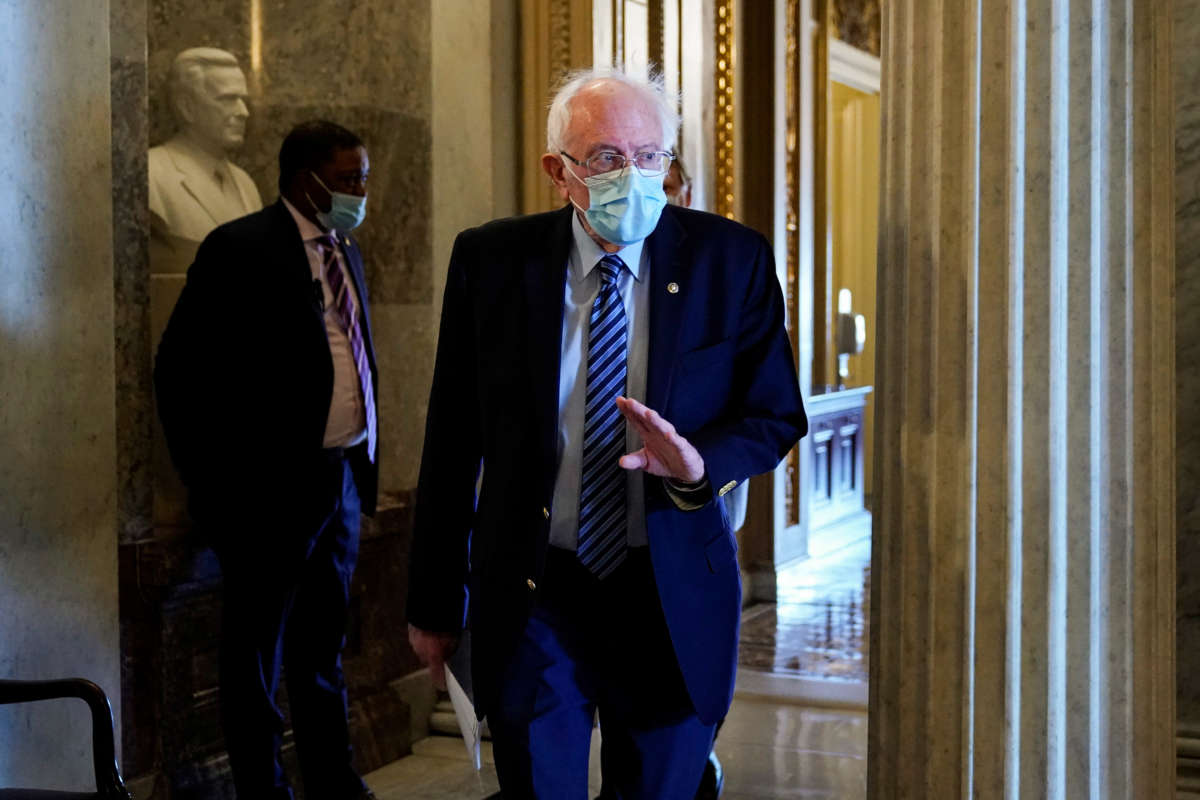Incoming Senate Budget Committee Chairman Bernie Sanders (D-Vermont) has said that he wants a new coronavirus relief bill to be one of the first priorities for the new Senate. He hopes to pass a new relief bill using budget reconciliation, which would allow for a simple majority vote, before the Senate begins their impeachment trial on February 8.
“Working families are living today in more economic desperation than since the Great Depression and if Republicans are willing to work with us to address that crisis, welcome, let’s do it,” Sanders said on CNN’s State of the Union on Sunday. “What we cannot do is wait weeks and weeks and months and months to go forward. We have got to act now.”
A new coronavirus bill could include more stimulus checks, additional unemployment benefits, support for the U.S. Postal Service and requiring hazard pay for frontline workers, Sanders wrote for CNN last week. Earlier this month, President Joe Biden also released a coronavirus economic relief bill that included provisions like raising the minimum wage to $15 an hour, expanding paid leave for families and $160 billion for a COVID plan, including funding for a vaccine program. The plan, however, is facing staunch opposition from Republicans.
Sanders pointed out that Republicans used budget reconciliation to pass tax cuts under Donald Trump and attempted to use it to repeal the Affordable Care Act. “[Republicans] did it, we’re going to do it. But we’re going to do it to protect ordinary people, not just the rich and powerful,” said Sanders. Reconciliation would allow Democrats to pass the bill with their newfound majority in the Senate — 50 votes, plus the vote of Vice President Kamala Harris — “as soon as possible,” Sanders said.
Sen. Bernie Sanders says Democrats will use reconciliation “as soon as we possibly can” to pass a Covid-19 relief package, which will allow for a 51 majority vote rather than 60.
“What we cannot do is wait weeks and weeks and months and months to go forward,” he says. #CNNSOTU pic.twitter.com/CWcT9PoZHn
— State of the Union (@CNNSotu) January 24, 2021
“We’ve got to do everything” before the impeachment trial starts soon, said Sanders on Sunday. “[We] don’t have the time to sit around [spending] weeks on impeachment and not get vaccines into the arms of people.”
The Senate is currently under a time crunch, with a relatively long to-do list to get through before the impeachment trial begins next month. House Speaker Nancy Pelosi is transmitting the House’s article of impeachment on Monday evening, which charges former President Donald Trump with inciting a violent coup attempt at the Capitol building in order to overturn the results of the election.
With the article’s delivery to the Senate, the trial was supposed to begin this week, but it has been delayed to accommodate the interests of both parties — Democrats wanted to push the trial back so that they could begin confirmations of Biden’s appointments and get started on Biden’s legislative agenda, while Senate Minority Leader Mitch McConnell wanted to give Trump’s legal team more time to prepare for the impeachment trial.
However, none of the appointment confirmations or stimulus bill talks can happen until Senate Majority Leader Chuck Schumer and McConnell can come to an agreement on governing the 50-50 Senate. Already McConnell has dragged out negotiations for over a week over his reported insistence on protecting the filibuster, leaving the Senate in limbo. Most committee work is frozen until the two can reach an agreement, and Schumer has roundly rejected McConnell’s demand.
During Barack Obama’s presidency, McConnell weaponized the filibuster to implement a sort of minority rule as he blocked bills in the Democratically controlled Senate. Many on the left have advocated for abolishing the filibuster altogether, even before power was handed over to Democrats this election cycle, saying that it is outdated and frequently wielded by Republicans to reject bills introduced by Democrats. But even as the Senate has stalled over the matter of the filibuster, some centrist Democrats like Virginia’s Joe Manchin have come out against the idea.
Join us in defending the truth before it’s too late
The future of independent journalism is uncertain, and the consequences of losing it are too grave to ignore. To ensure Truthout remains safe, strong, and free, we need to raise $33,000 in the next 2 days. Every dollar raised goes directly toward the costs of producing news you can trust.
Please give what you can — because by supporting us with a tax-deductible donation, you’re not just preserving a source of news, you’re helping to safeguard what’s left of our democracy.
